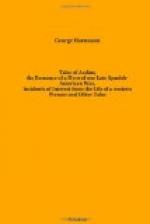We entered a spacious hall, which served as a dining-room, where eight young ladies were busily engaged arranging tables and furniture. The man intimated that he kept a hotel and begged the young ladies to see to my comfort and bade me consider myself as being at home. The girls were surprised and delighted to meet me and overwhelmed me with questions. They expressed the greatest concern and interest when they learned that I was about to cross the plains.
“Poor little Dutchy,” said one, “how could your mother send you out all alone into the cruel, wide world!” “Mercy, and among the Indians, too,” said another. When I replied that my dear mother had sent me away because she loved me truly, as she knew that I had a better chance to prosper in the United States than in the Fatherland, they called me a cute little chap and smothered me with their kisses.
The tallest and sweetest of these girls (her name was Rose) pulled my ears teasingly and asked if her big, little man was not afraid of the Indians. “Not I, madame,” I replied; “for my father charged me to be honest and loyal, brave and true, and fear not and prove myself a worthy scion of the noble House of Von Siebeneich.” “Oh, my! Oh, my!” cried the young ladies, and “Did you ever!” and “No, I never!” and “Who would have thought it!” Regarding me wide-eyed with astonishment, they listened with bated breath as I explained that I was a lineal descendant of the Knight Hartmann von Siebeneich, who achieved everlasting fame through impersonating the Emperor Frederick (Barbarossa) of Germany, in order to prevent his capture by the enemy. I told how the commander of the Italian army, inspired with admiration by the desperate valor of the loyal knight, released him and did honor him greatly. And how this noble knight, my father’s ancestor, followed the Emperor Frederick to the Holy Land and fought the Saracens. “And,” added I, “my father’s great book of heraldry contains the legend of the curse which fell on our house through the villainy of the Imperial Grand Chancellor of Blazonry, who was commanded to devise and procure a brand new heraldic escutcheon for our family.
“He blazoned our shield with the ominous motto, ’in der fix, Haben nix,’ over gules d’or on a stony field, which was sown to a harvest of tares and oats, and embossed with a whirlwind rampant. As they were in knightly honor bound to live up to the motto on their shield, my ancestor were doomed to remain poor forever. At last they took service with the free city of Hamburg, where they settled finally and became honored citizens.”




